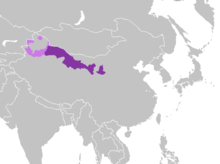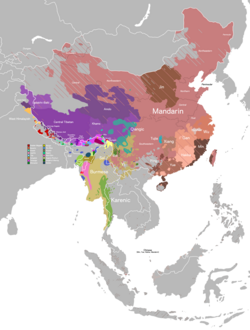lingvo.wikisort.org - Language
Lan–Yin Mandarin (Lanyin) (simplified Chinese: 兰银官话; traditional Chinese: 蘭銀官話; pinyin: Lán–Yín Guānhuà) is a branch of Mandarin Chinese traditionally spoken throughout Gansu province and in the northern part of Ningxia. In recent decades it has expanded into northern Xinjiang.[1] It forms part of Northwestern Mandarin, together with Central Plains Mandarin (Chinese: 中原官话).[2] The name is a compound of the capitals of the two former provinces where it dominates, Lanzhou and Yinchuan, which are also two of its principal subdialects.
| Lan–Yin Mandarin | |
|---|---|
| Region | Gansu, northern Ningxia, part of northern Xinjiang |
Native speakers | 10 million[citation needed] |
Language family | Sino-Tibetan
|
| Language codes | |
| ISO 639-3 | – |
| ISO 639-6 | lyiu |
| Glottolog | xibe1241 |
| Linguasphere | 79-AAA-bg |
 | |
Among Chinese Muslims, it was sometimes written in the Arabic alphabet instead of Chinese characters.
The 14th Dalai Lama, Tenzin Gyatso, spoke the Xining dialect as his first language: he has said that his first language was "a broken Xining language which was (a dialect of) the Chinese language", a form of Central Plains Mandarin, and his family speak neither Amdo Tibetan nor Lhasa Tibetan.[3][4][5]
Major Subdialects
- Lanzhou dialect (simplified Chinese: 兰州话; traditional Chinese: 蘭州話)
- Urumqi dialect (simplified Chinese: 乌鲁木齐话; traditional Chinese: 烏魯木齊話)
- Xining dialect (simplified Chinese: 西宁话; traditional Chinese: 西寧話)
- Yinchuan dialect (simplified Chinese: 银川话; traditional Chinese: 銀川話)
References
- China - Page 902 Chung Wah Chow, David Eimer, Caroline B Heller - 2009 "Language Most of the population in Qīnghǎi speaks a northwestern Chinese dialect similar to Gānsù huà (part of the Lan–Yin Mandarin family). Tibetans speak the Amdo or Kham dialects of Tibetan. It's possible to travel almost everywhere using ..."
- Cahiers de linguistique, Asie orientale - Volumes 37-38 -2008 - Page 6 "兰银官话 Lányín Mandarin.."
- Thomas Laird, The Story of Tibet: Conversations With the Dalai Lama Archived 1 March 2020 at the Wayback Machine, p. 262 (2007) "At that time in my village", he said, "we spoke a broken Chinese. As a child, I spoke Chinese first, but it was a broken Xining language which was (a dialect of) the Chinese language." "So your first language", I responded, "was a broken Chinese regional dialect, which we might call Xining Chinese. It was not Tibetan. You learned Tibetan when you came to Lhasa." "Yes", he answered, "that is correct ..."
- The economist, Volume 390, Issues 8618–8624. Economist Newspaper Ltd. 2009. p. 144. Archived from the original on 3 January 2020. Retrieved 14 August 2015.
- Politically incorrect tourism Archived 6 March 2016 at the Wayback Machine, The Economist, 26 February 2009: "When the Dalai Lama was born, the region, regarded by Tibetans as part of Amdo, a province of their historic homeland, was under the control of a Muslim warlord, Ma Bufang. The Dalai Lama and his family didn't learn Tibetan until they moved to Lhasa in 1939."
Другой контент может иметь иную лицензию. Перед использованием материалов сайта WikiSort.org внимательно изучите правила лицензирования конкретных элементов наполнения сайта.
WikiSort.org - проект по пересортировке и дополнению контента Википедии
